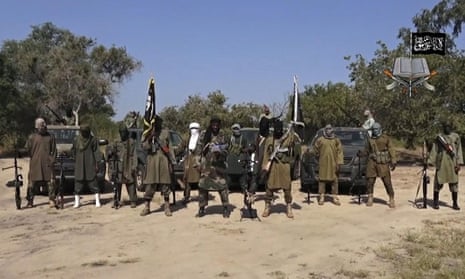Nigeria’s national security adviser has blamed cowardice for the army’s failure to protect civilians from attacks by Boko Haram extremists, saying many soldiers had joined up because they wanted a job, but were not willing to fight.
Sambo Dasuki rejected suggestions that the Nigerian garrison in the town of Baga, overrun by the Islamist group at the beginning of the month, had been under-equipped, citing the substantial arsenal seized by the attackers that was displayed by Boko Haram leader Abubakar Shekau in a video claiming responsibility posted online on Tuesday.
Speaking at the Royal Institute of International Affairs at Chatham House in London, Dasuki said that the list of equipment lost in Baga included six armoured cars with 4,000 rounds of heavy ammunition in each, as well as artillery pieces.
“Anyone who is saying that they are not well armed is not telling the truth,” the national security adviser to President Goodluck Jonathan said. “We had a lot of cowards, and it turned out there was a problem in the recruitment process … There were a lot of people who joined because they wanted a job, not because they wanted a career in the military. These are the people who ran away.”
Dasuki said that the shortcomings in army recruitment were being fixed, and the army was now going through retraining with British assistance. He added that two British trained army units had helped recapture Mubi in Adamawa state, taken by Boko Haram last October.
He said he was confident the army could be reformed and retrained. “We have not only laid the blame on the soldiers. We have put officers on trial who have shown very poor judgment,” Dasuki said. But he also had a clear message for the rank and file: “If you don’t want to fight, get out of the army. Don’t make excuses saying that you’re poorly equipped.”
He admitted that the last major procurement of equipment for the army was more than two decades ago, but said sophisticated equipment was not essential for counter-insurgency.
Dasuki also pointed out that Baga, a fishing town on the shores of Lake Chad, was meant to have been the headquarters of a regional multinational force, but the contingents from Niger, Chad and Cameroon had not arrived, leaving the Nigerians in the town to fight on their own.
Dasuki said that Nigeria was taking a “holistic” approach to the counter-insurgency, looking at the political and social causes of radicalisation. He estimated that 70% to 80% of Boko Haram fighters were from the Kanuri, an indigenous group with ancient roots in north-eastern Nigeria, who have since been eclipsed by the Hausa and Fulani people.











Comments (…)
Sign in or create your Guardian account to join the discussion